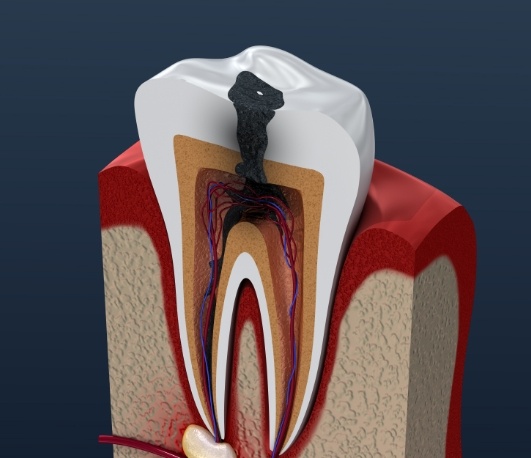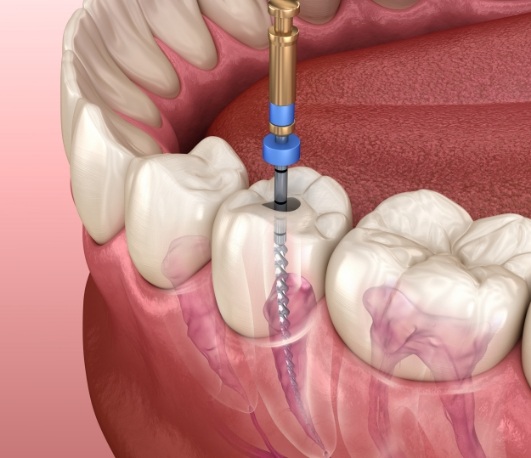Root Canal Treatment Waco
Getting to the Root of the Problem the Safe, Comfortable Way
Tooth pain and sensitivity are evidence of infection and decay. If you have a tooth infection, Heart of Texas Smiles General & Cosmetic Dentistry offers quick and virtually pain-free root canal treatment to repair and save a tooth that is badly decayed or infected. During a root canal procedure, the infected nerve and pulp are removed, and the inside of the tooth is cleaned and sealed. Without this treatment, the tissue surrounding the tooth also becomes infected, and dental abscesses may form causing even more pain and complications. Before oral infections get out of control, make an appointment by calling our office for the urgent root canal treatment in Waco you need to save your dental health.
Why Choose Heart of Texas Smiles General & Cosmetic Dentistry for Root Canal Treatment?
- Nitrous Oxide & Oral Conscious Sedation Available
- Same-Day Emergency Dental Appointments
- Your Dental Insurance PPO Plan Benefits Will Be Maximized
What Are Root Canals?

Root canals describe the natural cavities that occupy the center of your tooth. The pulp or pulp chamber is the soft area within the root canal where your tooth's nerve resides. Once adult teeth erupt, tooth nerves are no longer vitally important to a tooth's health and function. Since their only function is sensory, nerves that become infected are safely removed without affecting the day-to-day functioning of your tooth.
Why Do We Need Root Canal Treatment?

When your tooth's nerve tissue or pulp is damaged, it breaks down and dies. Bacteria inside the tooth begin to multiply. The bacteria and other decayed debris can cause infection inside the tooth or an abscess at the base of the tooth. An abscess is a pus-filled pocket that forms at the roots of the tooth. Untreated tooth infections in the root canal also cause:
- Extreme pain, discomfort, and sensitivity
- Swelling that may spread to other areas of the face, neck, or head
- Bone loss around the tooth
- A hole appears inside of the tooth with drainage into the gums or through the cheek
How Are Root Canals Treated?

- The first step in the root canal procedure is to take an X-ray to see the shape of the root canals and determine if there are any signs of infection.
- If it’s determined a root canal will save the tooth, local anesthetic and a rubber dam are applied to keep the area around the infected tooth dry and free of saliva during treatment.
- Next, an access hole is drilled into the crown of the tooth. The infected pulp along with bacteria and decayed nerve tissue are removed, and the inside of the tooth is disinfected.
- Then, the interior of the tooth is filled with a sealer paste and rubber compound called gutta-percha.
- Once the tooth is thoroughly cleaned and sealed, the exterior access hole created at the beginning of treatment is filled.
- The final step may be to restore the tooth with a dental crown for continued protection and proper functioning.
Understanding the Cost of Root Canals

If your dentist has recommended that you get a root canal, then it may be your best solution for saving a tooth that’s at risk. However, the last thing you’d want is to feel stressed about the overall cost of the treatment when you need it most. While our team can’t provide you with a precise price estimate without a consultation, we can walk you through some of the main factors that can influence how much you expect to pay. Until we can see you, here are several things to consider about the cost of a root canal in Waco.
Factors That Can Affect Root Canal Cost
Once we’ve been able to assess your situation, our team can more accurately predict the price of your root canal therapy. During your appointment, we’ll consider a few things for the overall cost, including:
- Location of your tooth – Since your back molars will consist of more roots than your front teeth, a root canal for them will typically cost more to perform.
- Complexity of your procedure – The more complicated your case is, the higher the likelihood that we’ll need to bring in a specialist, which can hike up the price of your treatment.
- Additional treatments – Even after undergoing root canal therapy, you may have to factor in the cost of tooth-replacement options, such as a dental crown to strengthen and protect the treated tooth.
Is it Cheaper to Pull My Tooth?
If you’re struggling with a painful or damaged tooth, it may seem simpler to just remove it instead of having to treat the issue. Unfortunately, choosing to extract it to avoid a root canal can end up costing you much more in the long term. Once you lose a tooth, your jawbone can start to deteriorate or shrink, which can create further complications for the rest of your pearly whites. You’ll likely have to replace the missing one with a dental bridge or implant, which can end up raising the overall price. Preserving your tooth with a root canal can be beneficial to both your smile and budget.
Does Dental Insurance Cover Root Canal Treatment?
The amount of dental insurance coverage for root canal therapy may vary from company to company. However, since this procedure is considered “essential,” it can receive anywhere from 50-80% coverage after you’ve met your deductible. Since insurance policies vary between providers, it’s a good idea to confirm the details of your plan so you know what to expect. While you can double-check with your insurance company, you can also consult our knowledgeable team, and we’ll be happy to help you navigate your policy and make the most of your benefits.
Other Options for Making Root Canals Affordable
If you don’t have dental insurance or aren’t happy with your coverage, you may be eligible for alternative financing options. Our team offers a Quality Dental Plan that can give you sizable discounts on all services after paying one low flat annual fee. We’re also partnered with third-party financiers like Lending Club and CareCredit which can break up the cost of your treatment into monthly installments. These may even come with little to no interest, meaning you won’t have to break the bank to receive the treatment you deserve!
Root Canal Treatment FAQs
Have you been told that you need a root canal? You may still have some unanswered questions about the procedure, so we’re here to help. Here are the answers to some of the most common questions we receive about root canal treatment in Waco. If you don’t see the information that you’re looking for below, don’t hesitate to give us a call. We’d be happy to walk you through the treatment process, so you know what to expect.
HOW LONG DOES IT TAKE TO RECOVER FROM A ROOT CANAL?
Recovery time is different for everyone. Many patients can return to work or school the day after their procedure. If your job is physically demanding, you may need to take two to three days off. This is because vigorous exercise can make the healing process take longer by diverting blood from the site. You will likely experience some soreness for a few days, but this can be managed with over-the-counter and/or prescribed pain medication from your dentist. During this time, stick to soft foods and chew on the opposite side of your mouth as the tooth that had the root canal. Brush and floss as you normally would but be extra gentle around your treated tooth.
WHAT SHOULD I DO BEFORE A ROOT CANAL?
In addition to eating a healthy meal and avoiding alcohol before your root canal, stay away from tobacco. Smoking can interfere with the numbing medication used. Most dentists recommend taking an over-the-counter pain reliever, like ibuprofen, right before the procedure to reduce the discomfort as the numbness wears off. Get a good night’s sleep before your root canal. This will help you to feel less nervous and ensure that your immune system is ready to help you recover quickly.
HOW LONG DO ROOT CANALS LAST?
Root canals have a very high success rate. Most teeth that have been treated with root canal therapy go on to provide full chewing function for many years, or even a lifetime. The longevity of your root canal will depend on various factors, like the extent of damage to the tooth. To help your root canal last, it’s important to closely follow your dentist’s post-op instructions and practice excellent oral hygiene.
CAN I TAKE ANTIBIOTICS INSTEAD OF GETTING A ROOT CANAL?
Antibiotics can treat bacterial infections in almost every other part of the body, but they do not work on tooth infections. This is because antibiotics travel through the bloodstream to target infected areas of the body, but the bloodstream cannot reach the pulp of a tooth. Ultimately, it is unable to eliminate an infection there. If a tooth is infected, the only options to treat it are with root canal therapy or an extraction.
I Need a Checkup & Cleaning I am Worried About Gum Disease I Need a Dentist for My Child I Have a Cavity or Broken Tooth I am Missing One or More Teeth I Want to Enhance My Smile I Want a Straighter Smile I am Scared of the Dentist I Have Jaw Pain I'm Having Trouble Sleeping I Have a Dental Emergency View Our Services

